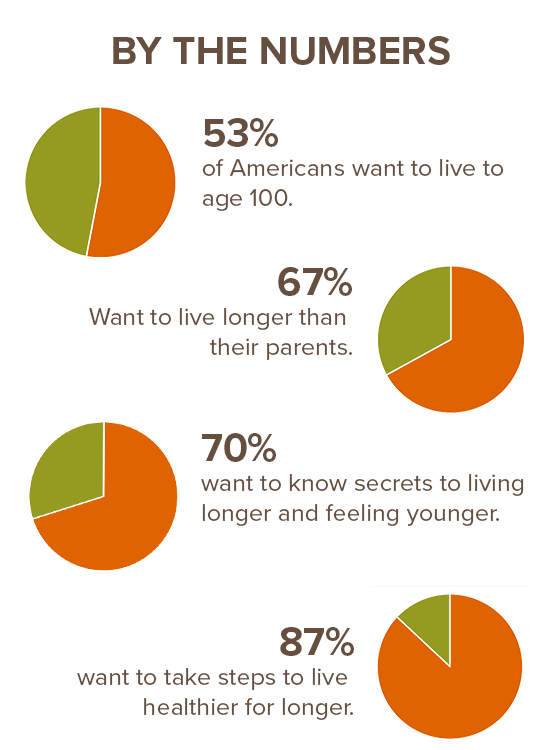What's Your Longevity IQ?
Take our quiz and learn more about aging well.
Longevity isn't about age. Lifestyle choices can help you live younger for longer. Think about your longevity: If you could live to any age, what would it be? In a new MDVIP/Ipsos study, more than half of Americans say they would like to live to the age of 100 or older.
Respondents also say they want to know the secrets to living and feeling younger than their calendar age and feel as if they have a lot of control over how long they live. These sentiments are encouraging, because it means we are starting to pay more attention to aging as something to embrace in life, not dread.
5 Steps to Live Younger Longer
The average American will live into their late 70s. While medical experts expect life spans to increase in the coming years — possibly to more than 100 years of age — they’re increasingly worried about our health spans. Health span is the period of our lives we live without debilitating diseases and mobility issues Unfortunately, it’s not something we focus on when we’re planning our golden years.
But 90% of Americans want to take steps to live healthier for longer, according to a new MDVIP/Ipsos longevity study. But only one in three talk about it with the one person who can help them the most: their doctor.
The formula for living healthier longer is actually pretty simple. By partnering with your MDVIP-affiliated physician, you’ve already taken the first step.
Studies show that people who have long-term relationships with their primary care doctor live longer. Your doctor can also help you focus on things you can do to live a longer life, such as:
Eat A Mediterranean-Style Diet.
People who eat a diet rich in fruits and vegetables and lean protein like fish, whole grains, nuts and legumes live longer and have fewer instances of type 2 diabetes, obesity, heart disease and cancer. Traditional Western diets, rich in processed foods and red meat, are associated with a 22% higher risk of death.
Exercise Often.
Exercise reduces our risk for debilitating chronic illnesses like heart disease, diabetes and even dementia. In addition to strengthening muscles and bones, exercise helps reduce stress, improve mood and manage weight. In general, being physically active improves your odds for living longer. People who exercise between 2.6 and 4.5 hours per week have a 40% lower risk of dying from all causes.
Manage Your Stress and Mental Health.
Stress, anxiety and depression shorten our lives. People with depression can lose up to 28 years of quality life. Chronic stress reduces life span and ages us faster. But good health habits like exercise and quality sleep can help you manage your mental health. Your primary care doctor can help, too.
Get Plenty of Sleep.
When we miss sleep, our bodies release hormones that affect our mood and stress levels. These hormones negatively influence the diversity of our gut bacteria, which in turn affects immunity and cognition.
Make Good Sleep a Habit.
People who have longer health spans tend to get more consistent sleep, about 7 to 8 hours of sleep each night. Less sleep puts us at higher risk for chronic illnesses like depression and heart disease as well as early death.
Build Strong Social Circles.
Having at least six different social connections a month has long been associated with positive outcomes: Studies show that blood markers for immune response are different between lonely people and those who are social. And kindness to others generates better immune function.


